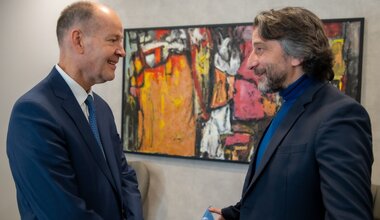Beyond baking: How an UNMIK and EULEX collaboration will build skills and opportunities for incarcerated women in Kosovo
At the Lipjan/Lipljan Correctional Center for Women and Juveniles, women these days are busy at work measuring ingredients, monitoring ovens, and testing out their new equipment.
What might seem like an ordinary bakery represents far more than fresh bread: it serves as a chance for women and juveniles to build skills they can take with them upon return to their communities.
The new industrial-scale bakery, funded in partnership by UNMIK and EULEX and implemented by UNOPS, will operate as a training centre for women and juvenile inmates, and will additionally produce fresh baked goods for the facility and surrounding prisons.

The project is part of UNMIK’s greater strategy to support the rule of law and justice institutions in Kosovo with initiatives that strengthen the human rights of those incarcerated and reduce the likelihood that prisoners will return to the correctional system after release.

Cutting the Ribbon: DSRSG Barrie Freeman, Deputy Minister of Justice, Blerim Sallahu, and the Acting General Director of the Kosovo Correctional Service (KCS), Rasim Selmani, are all smiles as they unveil the new bakery.
Speaking at the bakery’s unveiling on 27 July, where UNMIK and EULEX representatives were treated to creations including buns, cake, and cornbread, Deputy Special Representative of the Secretary-General Barrie Freeman emphasized the importance of skill-building initiatives in correctional facilities.
“All too often, the driving principle behind prisoner treatment has been to see these individuals as separate from their communities and societies. This project seeks the opposite – the bakery is intended to be self-sustaining and offers meaningful vocational training to the women and young people incarcerated here, increasing their rehabilitation opportunities and easing their way back to being successful members of their communities upon completion of their time served.”

DSRSG Freeman tours the bakery and chats with Kosovo Deputy Minister of Justice, Blerim Sallahu, Acting General Director of the Kosovo Correctional Service (KCS), Rasim Selmani, and Heset Loku, Director of Lipjan/Lipljan Correctional Center
DSRSG Freeman also emphasized that the project affirms UNMIK’s commitment to the Mandela Principles, which as DSRSG explained, “are grounded in the belief that an effective prison system must provide safe incarceration of inmates in an environment that promotes their rehabilitation and reentry into productive civilian life.”

For those working in Lipjan Correctional Center, the bakery offers a chance to meaningfully collaborate and contribute to the future well-being of inmates of the Center.
According to Fatlinda Mustafa, who works with inmates as a Program Officer in Lipjan/Lipljan, the facility had been lacking adequate equipment, despite a demonstrated need for vocational skills training, for some time.
“There was a great need to make this bakery operational. The women here are very interested in learning, as they will be certified in this field, which will help them very much in their daily life after release to find jobs.”
Antero Lopes, Director of Rule of Law for UNMIK, agreed that vocational training for life after release is crucial: "creating opportunities for inmates who want to upgrade their skills for a better post-prison life is a function of corrections, which facilitates social reintegration and prevents relapse for a stronger rule of law.” Another employee of the Center, who works in the kitchen and is now training inmates in baking skills, noted to UNMIK that inmates were enthused about the project, and that the bakery’s ability to produce food for the surrounding facilities had been greatly beneficial.


Deputy Minister of Justice, Blerim Sallahu and Director of Rule of Law for UNMIK, Antero Lopes, look on as colleagues discuss the bakery’s unveiling.
Baking to break the cycle of incarceration
In Kosovo, where formerly incarcerated women often struggle to find employment, the bakery offers a chance to build a new, independent future. As Ritva Vahakoski, the Head of EULEX’s Correctional Unit noted: “This project is centered on the idea that sentenced persons can acquire baking skills and hands-on experience, which will help them find a job within the culinary industry after their release. This kind of work gives people a purpose and a sense of achievement and is a key mechanism to prevent recidivism.”

Also attending the bakery unveiling were the Deputy Minister of Justice, Blerim Sallahu, the Acting General Director of the Kosovo Correctional Service (KCS), Rasim Selmani, and other representatives of Kosovo and international organizations, including OSCE and the UNDP Resident Representative.

Thanking the donors for their support, Kosovo’s Deputy Justice Minister said: “The inauguration of this bakery also marks the beginning of work for a significant number of female convicts in this facility. The Ministry of Justice is committed to supporting such activities which have an impact on the rehabilitation and reintegration of persons deprived of their liberty, and which ensure economic sustainability of correctional facilities.”
Indeed, while the many baked goods on display during the unveiling provided a tasty distraction, the main message – that of upholding prisoners’ rights and building skills to assist with community re-entry – remained the day’s focus.

 UN
UN United Nations Peacekeeping
United Nations Peacekeeping





